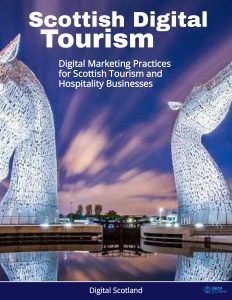The Rise of TravelTech: Revolutionizing the Way We Explore the World
A showcase of technology innovations and Scottish pioneers at the heart of the future of tourism experiences.
 The travel industry has always been a dynamic space, adapting to cultural shifts, economic changes, and technological advancements.
The travel industry has always been a dynamic space, adapting to cultural shifts, economic changes, and technological advancements.
In recent years, a new wave of innovation has transformed how we plan, experience, and share our journeys: ‘TravelTech’.
This burgeoning sector, blending travel with cutting-edge technology, is redefining the travel landscape by enhancing convenience, personalization, and sustainability. From AI-powered trip planners to blockchain-based booking systems, TravelTech is reshaping the way we explore the world.
What is TravelTech?
TravelTech refers to the application of technology to streamline and enhance the travel experience. It encompasses a wide range of solutions, including mobile apps, artificial intelligence (AI), virtual reality (VR), blockchain, and the Internet of Things (IoT), applied across various aspects of travel—booking, navigation, accommodation, and beyond. The sector addresses pain points for travelers, businesses, and service providers, offering seamless, efficient, and personalized solutions.
The global TravelTech market is booming. According to industry reports, the market size was valued at over $9 billion in 2022 and is projected to grow at a compound annual growth rate (CAGR) of around 8% through 2030. This growth is fueled by increasing smartphone penetration, rising demand for personalized travel experiences, and the need for sustainable travel solutions.
Key Innovations in TravelTech
AI and Machine Learning: Personalization at Scale
Artificial intelligence is at the heart of TravelTech, enabling hyper-personalized travel experiences. AI-powered platforms analyze user data—preferences, budgets, and past trips—to recommend tailored destinations, accommodations, and activities. For example, companies like Hopper use AI to predict flight and hotel price fluctuations, advising travelers on the best time to book.
Chatbots and virtual assistants, such as those integrated into platforms like Expedia or Kayak, provide real-time customer support, answering queries about bookings, cancellations, or itinerary changes. These tools leverage natural language processing (NLP) to offer conversational, human-like interactions, reducing the burden on customer service teams.
Mobile Apps: Travel in Your Pocket
Smartphones have become indispensable travel companions, and TravelTech has capitalized on this trend. Mobile apps like Google Maps, TripIt, and Airbnb consolidate essential travel functions—navigation, itinerary management, and accommodation booking—into user-friendly interfaces. Apps like Citymapper go further, offering real-time public transit updates and multi-modal route planning for urban travelers.
Augmented reality (AR) is also gaining traction. Apps like Google Lens allow users to point their phone cameras at landmarks or signs to access instant translations or historical information, enriching the travel experience.
Blockchain: Secure and Transparent Transactions
Blockchain technology is addressing trust and security concerns in travel. It enables secure, decentralized booking systems, reducing reliance on intermediaries like online travel agencies (OTAs). Platforms like Winding Tree use blockchain to connect travelers directly with service providers, cutting costs and increasing transparency.
Blockchain also streamlines loyalty programs. Instead of fragmented reward systems, travelers can earn and redeem universal tokens across airlines, hotels, and other services, simplifying the process and enhancing flexibility.
Sustainable Travel Solutions
As environmental concerns grow, TravelTech is prioritizing sustainability. Platforms like Skyscanner now highlight “greener” flight options based on carbon emissions, while apps like GreenGlobe help travelers find eco-friendly accommodations. Startups like Cool Cousin connect users with local guides to promote authentic, low-impact tourism.
IoT devices are also playing a role. Smart hotels use sensors to optimize energy consumption, reducing waste while maintaining guest comfort. These innovations align with the growing demand for responsible travel, particularly among younger generations.
Virtual and Augmented Reality: Immersive Experiences
Virtual reality is transforming how travelers research and experience destinations. VR platforms allow users to take virtual tours of hotels, attractions, or entire cities before booking. For instance, Marriott Hotels has experimented with VR to showcase properties, giving guests a “try before you buy” experience.
AR enhances on-the-ground exploration. Apps like AR City overlay digital information onto real-world views, providing historical context or navigation cues as travelers explore new places.
The Future of TravelTech
The future of TravelTech is bright, with several trends poised to shape the industry:
- Contactless Travel: Post-pandemic, touchless check-ins, digital passports, and biometric authentication (e.g., facial recognition at airports) are becoming standard.
- Metaverse Integration: As the metaverse evolves, virtual travel experiences could become mainstream, allowing users to “visit” destinations in fully immersive digital environments.
- AI-Driven Hyper-Personalization: Advances in AI will enable even more granular customization, from curated dining suggestions to real-time itinerary adjustments based on weather or crowd levels.
- Sustainability as a Priority: TravelTech will continue to innovate in eco-friendly solutions, such as carbon offset integrations and AI-optimized travel routes to minimize environmental impact.
Scottish TravelTech Pioneers
The UK traveltech sector has reached record investment levels, with Edinburgh emerging as a key hub, driven by advancements in AI, according to a Dealroom analysis commissioned by the Traveltech Innovation Hub at Edinburgh Futures Institute, led by Joshua Ryan-Saha, Director.
Edinburgh hosts major players like Skyscanner, TravelNest, Citizen Ticket, and TravelPerk, which recently opened a new office in the city.
The report highlights Edinburgh’s AI expertise and innovation ecosystem as key drivers, with AI transforming how travel is discovered, booked, and experienced. Edinburgh-based Obvlo recently raising $2 million (£1.5m) to develop AI solutions for personalised local content for travel and hotel brands such as Virgin Hotels.
Conclusion
TravelTech is more than a trend—it’s a transformative force in the travel industry. By leveraging AI, blockchain, VR, and other technologies, it empowers travelers with greater control, flexibility, and access to unique experiences. As the sector continues to evolve, it promises to make travel more seamless, sustainable, and personalized, ensuring that the journey is as rewarding as the destination. Whether you’re a frequent flyer or an occasional explorer, TravelTech is paving the way for a new era of global adventure.



